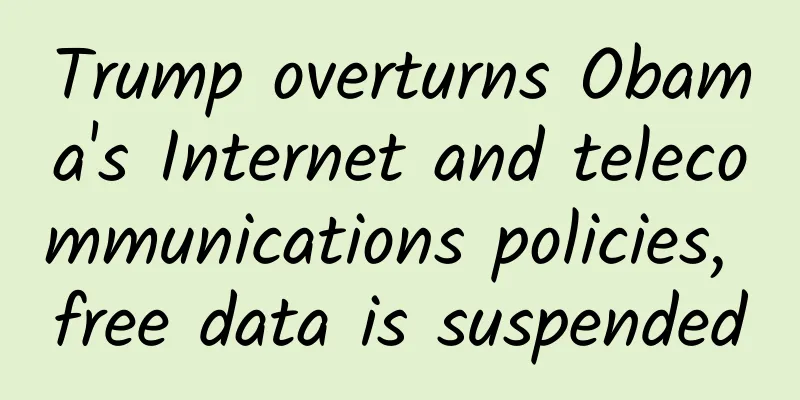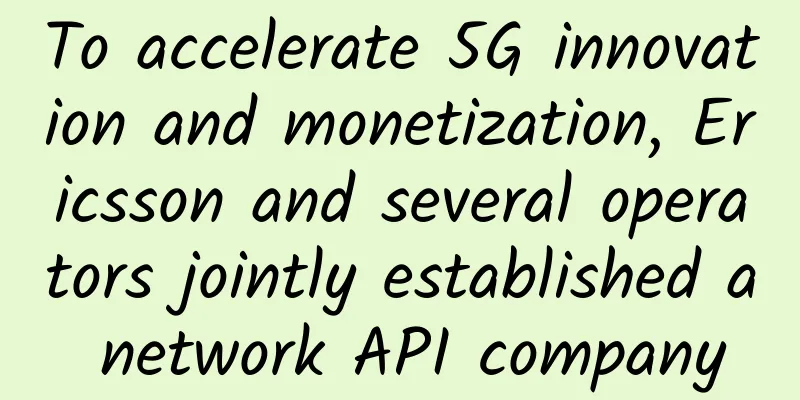Trump overturns Obama's Internet and telecommunications policies, free data is suspended

|
[Original article from 51CTO.com] During Obama's tenure as the head of the United States, he made some reforms to the regulation of U.S. telecommunications and the Internet, such as promoting the popularization of broadband for low-income households. He also firmly supported network neutrality and opposed the merger of large telecommunications giants to protect the interests of consumers. After Trump entered the White House, he has overturned many of Obama's past economic and trade policies. Now, Trump is also preparing to overturn some of Obama's policies on telecommunications and the Internet.
According to the Associated Press, during the Obama era, some decisions made by the FCC (Federal Communications Commission, the U.S. government agency that regulates telecommunications, television broadcasting, and Internet services) often annoyed operators, but now the direction is beginning to change. Just on Friday, Ajit Pai, the new FCC chairman appointed by Trump, said that some telecom operators' practice of free traffic for specific services is beneficial to consumers. The practice of free data usage by mobile operators is actually very common in China. Operators will cooperate with Internet companies to allow specific services to enjoy lower data charges or include them in the unlimited data range. However, some consumer rights organizations in the United States believe that this practice violates market fairness and will ultimately affect the interests of consumers. During the Obama administration, the FCC criticized telecom giant AT&T, saying that AT&T included its own TV streaming service in the unlimited data coverage of mobile phone users, harming other competitors. Before Trump took office as US president in January, the FCC issued a report criticizing the free data charges of telecom companies such as AT&T and Verizon, calling them "anti-consumer" actions. However, the FCC did not require telecom operators to change their practices immediately. In fact, the above-mentioned free mobile data practice is also part of the network neutrality controversy. During the Obama administration, the FCC supported network neutrality, which means that telecommunications companies cannot distinguish or discriminate against Internet companies' data transmitted on the network, and cannot provide higher network speeds or lower rates for their own businesses. But the new FCC head, Akit Pai, has a different view on net neutrality. Trump's previous policy adjustments show that he attaches more importance to the interests of enterprises, encourages competition and innovation among enterprises, and encourages them to create more jobs by loosening restrictions. Therefore, the media pointed out that in the telecommunications industry and the Internet sector, Trump will also introduce more policies to support operators. At the end of last year, Pan Jit believed that the US government should cancel some unnecessary regulatory measures in the telecommunications industry and remove those restrictive policies on investment and innovation. In addition, during the Reagan administration, the United States launched a program to subsidize telecommunications services for low-income families, with the goal of making basic telecommunications services a must-have for American families. In the Obama era, these subsidy policies were upgraded. Previously, the FCC had announced that it would allow low-income families to use the $9.25 monthly government subsidy they enjoyed for Internet access. In the past, this subsidy could only be used for landline and mobile phone calls. However, according to The Washington Post, Pan has decided to overturn the FCC's subsidy policy. Just a few weeks ago, nine U.S. telecom companies were notified to participate in the above subsidies. However, the FCC recently notified these companies that they are not allowed to participate in the subsidy program for low-income families. It is reported that the above-mentioned policy of subsidizing Internet access was opposed by Pai and some Republicans when it was introduced, who believed that it would lead to increased spending, waste, and fraudulent claims by some low-income families. [51CTO original article, please indicate the original author and source as 51CTO.com when reprinting on partner sites] To learn more about hot news, please follow 51CTO's "Technology News Morning Report" column! |
<<: Accelerating NFV interoperability testing
>>: Does your phone support 5G wifi? Is 5G Internet access really fast?
Recommend
A comprehensive analysis of IoT positioning technology! Positioning is moving from outdoor to indoor
As early as the 15th century, when humans began t...
Why Microsoft won't rebuild Windows based on the Linux kernel
A few weeks ago, the opinion of Eric S Raymond, a...
The battle of 1G to 5G, the communication reshuffle is about to begin
Recently, there has been a big conflict between H...
South Korea: 14 6G communication satellites will be launched before 2031
June 21 news, according to foreign media reports,...
Seizing the 5G trend, smart city construction enters a new stage
With the arrival of the new 5G infrastructure wav...
5 ways 5G will change the world
As communications technology goes, the switch fro...
The Ministry of Industry and Information Technology has implemented new measures to promote the accelerated development of 5G and accelerate the construction of the new economic form of "5G+".
my country's 5G development has once again re...
In-depth analysis of the Raft protocol and KRaft practical demonstration
1. What is the Raft protocol? The Raft protocol i...
IT Viewpoint: Five major network challenges for 2019
Frank Scalzo, network director at data center ope...
In-depth analysis of the difficulties and challenges of 5G core network construction
At present, the core network is in a critical per...
What impact will the cancellation of data roaming have on telecom operators?
With the development of economy and society, the ...
User Datagram Protocol (UDP) in plain language
What is UDP? UDP is the abbreviation of User Data...
How Apple's iCloud Private Relay powers enterprise VPNs
Apple's iCloud Private Relay service offers p...
Hostodo: Las Vegas/Miami NVMe hard drive VPS from $19.99 per year
Hostodo is a foreign VPS hosting company founded ...






![[Black Friday] DediPath: 35% off VPS/Hybrid Servers starting at $1.2/month, 1Gbps unlimited traffic, multiple data centers in Los Angeles and other places](/upload/images/67cabff351bf1.webp)


